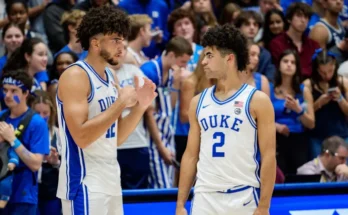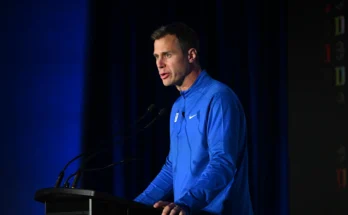Built Through Adversity: Bilhal Kone Is Committed to Upholding His Family’s Honor
The hardwood can be unforgiving, but for Bilhal Kone, it has always felt like home—a place where pain is transformed into purpose, and every drop of sweat pays homage to a family legacy defined not by ease, but by endurance.
Kone, a 6-foot-8 forward from Mali, didn’t take the traditional path to collegiate stardom. His journey is stitched together by sacrifice, relocation, and relentless grit—a story that goes beyond basketball. It’s about a young man molded by adversity and fueled by a desire to honor the family that lifted him out of obscurity.
Born and raised in Bamako, Mali, Kone was surrounded by modest means and immense love. His parents, hardworking and deeply rooted in community values, emphasized education, faith, and discipline. From an early age, Bilhal saw his family sacrifice to provide even the most basic needs. His mother, in particular, remains the cornerstone of his strength.
“There were nights we had no power, no running water,” Kone recalled. “But my mother always said, ‘Your purpose is bigger than your problems.’ I live by that.”
Tragedy, however, struck the Kone household when Bilhal was just 11 years old. His father passed away suddenly due to illness. That loss—one that might’ve broken others—became the crucible in which Bilhal’s commitment to excellence was forged. Overnight, he became the man of the house, watching over his younger siblings while trying to maintain his own boyhood.
Kone’s introduction to basketball was almost accidental. He had been drawn to soccer like most kids in Mali, but a growth spurt and a natural sense of timing put him on a different path. A local coach noticed him and invited him to try out for a youth team. With no formal training, Kone struggled initially. But he kept showing up—day after day—driven by a force stronger than skill.
“I wasn’t good,” he admitted with a laugh. “But I was hungry. I had something to prove—not just to others, but to myself.”
That hunger caught the attention of scouts from the NBA Academy Africa, a program designed to develop elite basketball talent across the continent. Kone earned a spot in the academy and began training among the best in the region. For the first time, he had access to proper equipment, coaching, and nutrition. But it was also the first time he was truly away from his family.
“That was the hardest part—being alone,” he said. “Every night I called my mom. I told her, ‘One day, this will all be worth it.’”
The NBA Academy opened doors for Kone, including an opportunity to attend high school in the United States. He enrolled at Orangeville Prep in Canada, one of the top basketball prep programs in North America, known for producing NBA talent like Jamal Murray and Thon Maker.
In the frigid air of Ontario, far from the warmth of Mali, Kone grew—not just in stature, but in maturity. The language barrier, cultural shift, and homesickness all hit hard. But he leaned on the values instilled by his mother: perseverance, humility, and faith.
“I would write notes to myself,” he said. “On my mirror, I wrote: ‘Be the example they will talk about back home.’”
By his senior year, Kone was a standout, averaging a double-double and catching the attention of Division I programs across the United States. His relentless work ethic and quiet leadership made him a coveted recruit—not just for his physical tools, but for the intangibles that coaches dream about.
Kone committed to the University of Massachusetts (UMass), a program looking to return to national relevance. It was a calculated choice—Kone didn’t want hype. He wanted a home. He wanted to build something.
From the moment he stepped onto the Amherst campus, it was clear that Kone wasn’t the average freshman. He spent early mornings in the gym, late nights studying film, and countless hours mentoring younger teammates. His coaches saw the potential, but more importantly, they saw the person.
“Bilhal is the kind of player every coach wants,” said UMass head coach Frank Martin. “But he’s an even better human being. He elevates everyone around him.”
His freshman campaign was a learning curve. Kone played limited minutes but made the most of every opportunity—diving for loose balls, setting hard screens, and defending with pride. By his sophomore season, he emerged as a starter and vocal leader, anchoring the defense and averaging near double-digits in points and rebounds.
Despite his growing success, Kone has never been fully free from the shadows of hardship. In his junior year, he received devastating news: his younger brother in Mali had been diagnosed with a rare illness. Because of financial constraints, treatment options were limited. Bilhal sent nearly every dollar he had saved back home.
“There were days I ate once,” he said. “But I had no choice. He’s my little brother. That’s what family does.”
He played through the anguish, never once complaining. He wore the pain like armor, using it to power his game and presence. He refused to sit out, saying, “Every game is a chance to honor my family.”
Fortunately, through a GoFundMe campaign started by teammates and community members, enough money was raised for his brother’s treatment. The experience not only saved a life—it showcased the profound impact Kone had on those around him.
More than stats or trophies, Bilhal Kone is motivated by a mission: to uplift the name of his family and prove that adversity doesn’t define destiny—it refines it.
“Back home, they don’t care if I score 20,” Kone said. “They care if I do it with dignity. If I represent them well.”
Every time he steps on the court, he taps his chest and points to the sky—a silent tribute to his father and a promise to his mother that their sacrifices were not in vain.
His story resonates far beyond basketball. In classrooms, Kone speaks to student groups about resilience. In his free time, he volunteers with immigrant support programs, helping other young athletes navigate their own transitions to the U.S.
“He’s a walking lesson in perspective,” said teammate RJ Luis. “When you’re around him, you can’t help but be better.”
With NBA scouts now taking notice, Kone’s future seems bright. But he remains grounded.
“If it comes, it comes,” he said of a potential professional career. “I’m more focused on being ready. On staying true to who I am.”
He plans to return to Mali someday, not just to visit, but to build. A basketball court. A youth center. A future.
“Everything I do is about going back,” he said. “I want to give kids what I didn’t have. Hope. Opportunity. A reason to believe.”
In an age of highlight reels and quick fame, Bilhal Kone is a reminder of something deeper: that character outlasts clout, and that greatness often grows from the harshest soil.
He is not just playing for a team—he’s playing for a name, a family, a country.
“Adversity didn’t break me,” he said. “It built me. And now, I build for others.”
Bilhal Kone may one day hear his name called on draft night. But for those who know his story, his legacy is already secured. Not in points scored, but in honor restored.



